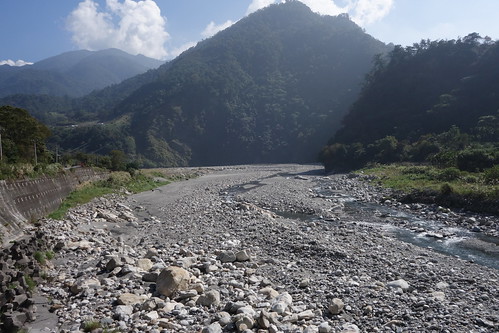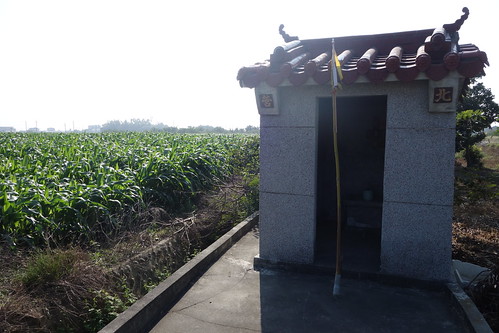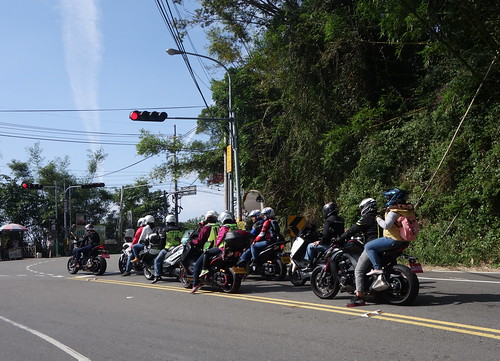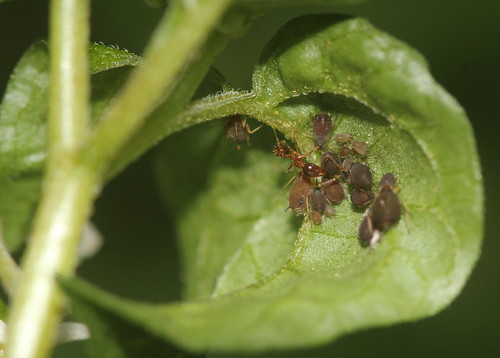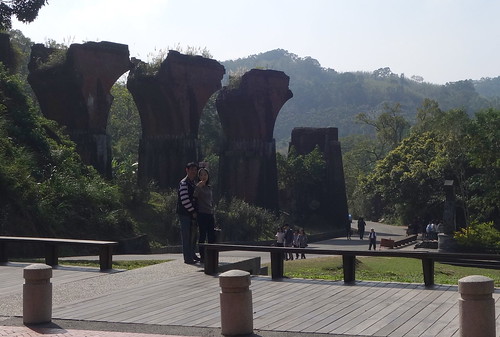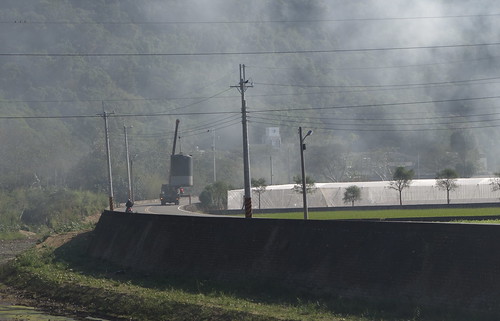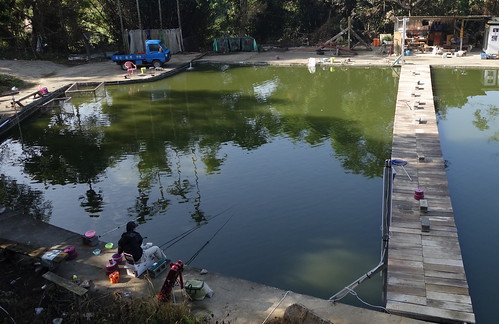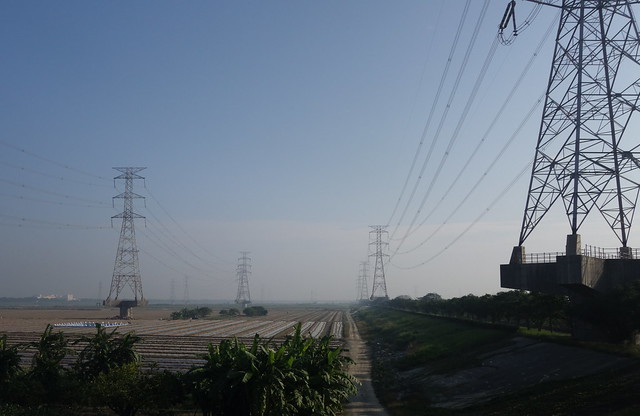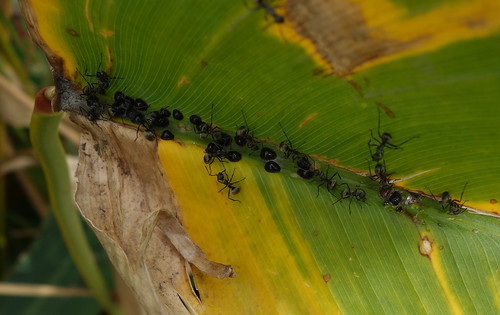Taking a couple of weeks off. Wishing you the happiest of new years. See everyone in February.
_______________________
[Taiwan] Don't miss the comments below! And check out my blog and its sidebars for events, links to previous posts and picture posts, and scores of links to other Taiwan blogs and forums!
Wednesday, January 18, 2017
Saturday, January 14, 2017
What will Trump do? + Links
A small shrine tucked away in a field
NYTimes reports that Taiwan moves to shore up its central american friends, but the really ominous thing wasn't the possibility that they might bolt, but what happened in Nigeria, where Beijing forced the Taiwan office to move, is far more dangerous. Diplomatic allies are not as important as the everyday engagement Taiwan has with nations all over the world.
Another problem: Trump again says "one China" policy up for negotiation. This comment is entirely lacking in definition, though it is widely reported. What does he mean? Though Bonnie Glaser says China is preparing for rocky relations in 2017. If someone senior in the administration would contact me, I would be most grateful. At The News Lens Wayne Pajunen writes:
Shirley Kan: China's military provocations ARE NOT mere responses to Trump
__________________
Daily Links:
[Taiwan] Don't miss the comments below! And check out my blog and its sidebars for events, links to previous posts and picture posts, and scores of links to other Taiwan blogs and forums!
NYTimes reports that Taiwan moves to shore up its central american friends, but the really ominous thing wasn't the possibility that they might bolt, but what happened in Nigeria, where Beijing forced the Taiwan office to move, is far more dangerous. Diplomatic allies are not as important as the everyday engagement Taiwan has with nations all over the world.
This week, another move showed that even countries without diplomatic ties to Taiwan could still isolate it further. On Wednesday, Nigeria ordered Taiwan to move a representative office in the country out of the political capital, Abuja, to Lagos, the country's commercial hub. Nigeria has not had official diplomatic relations with Taiwan since 1971, so it doesn’t have an embassy in Abuja to move; instead, Taiwan was forced to move its trade mission, one of about 50 unofficial representative offices it has around the world.That mission had been serving the small Taiwan factory investment community there. China offered to sink $40 billion into projects there... wonder how much will actually appear. Meanwhile the US is spending billions bombing wedding parties and barbecues in the Middle East. Hmm......
Another problem: Trump again says "one China" policy up for negotiation. This comment is entirely lacking in definition, though it is widely reported. What does he mean? Though Bonnie Glaser says China is preparing for rocky relations in 2017. If someone senior in the administration would contact me, I would be most grateful. At The News Lens Wayne Pajunen writes:
Among the ongoing tit-for-tat of Trump tweet vs. CCP bark, keeping in mind the Chinese proverb: a barking dog never bites (會叫的狗不會咬人), PRC Foreign Minister Wang Yi (王毅) responded, “China is paying close attention to developments,” Wang said. “I can clearly say that no matter whether the Tsai Ing-wen authority, any other person in the world, or any other force, if they try and damage the one-China principle and harm China’s core interests, in the end they are lifting a rock only to drop it on their feet.”"The barking dog never bites" may also apply to Trump. It's maddening how little concrete information there is about his Administration's views and plans. Rosalyn Hsueh in WaPo writes on his trade policy with China, while Michael Pillsbury argues that Trump can stand up to China without provoking a war.
Beijing is always very careful to respond only with threatening rhetoric while never drawing lines in the sand demarking tangible retaliatory actions. To date, the uncertainty created by CCP bluster has been sufficient to deter the democratic nations to do Beijing’s bidding and isolate Taiwan.
Shirley Kan: China's military provocations ARE NOT mere responses to Trump
__________________
Daily Links:
- Finally! Gangsters swept up after violence at public hearings
- Taiwan needs to end practices like Indonesian slavery aboard Taiwanese fishing vessels if it ever wants to make friends
- NYTimes: Taiwan moves to shore up its central american friends. Russell Hsiao in The National Interest explores this problem.
- US lawmakers introduce Taiwan Travel Act to encourage high level exchanges
- Cute: Singapore sings for the return of its armored vehicles but China is using them to pressure Singapore to reduce relations with Taiwan
- VOA: Tsai meets with ranking Republicans: why?
- NCCU removing a couple of CKS statues
- Taiwan film industry should explore collaboration with other centers of the industry
- Japanese lobby IOC to let Taiwan be "Taiwan"
- Indigenous legislator on fight for aboriginal self-determination in Taiwan
- Significance of Taiwan-Japan maritime dialogue
- A person monitoring the BBC "What is the one China principle? site says its improved. *shudder*. It is still pro-China, and wrong. Hilaribad....
- Jeff Bader, former Obama Asia chief, on four proposals for China. As a longtime observer noted, the claim that the PRC going soft on Taiwan issue will result in party collapse is propaganda.
- Global Taiwan Brief latest
- Strategic memory diplomacy, used by Ma?
[Taiwan] Don't miss the comments below! And check out my blog and its sidebars for events, links to previous posts and picture posts, and scores of links to other Taiwan blogs and forums!
BBC still pro-China, just not as bad
Motorcycle gangs, Taiwan style
Here is BBC's response to my complaint on this hugely pro-China backgrounder over a year ago. Despite the changes, the piece remains powerfully pro-China and studded with errors. For example, the TRA doesn't obligate the US to sell weapons or do anything else, as Chris Nelson explained these many years ago. But you can hardly expect a non-specialist to understand the arcanity of Taiwan in US politics. And although they have corrected some of the factual errors, the powerful pro-China slant remains. I guess the "C" in BBC stands for "China"....
Dear Mr Turton
Ref: CAS-3580463-1F12HS
Thank you for getting in touch about our feature article “What's behind the China-Taiwan divide?” (http://www.bbc.co.uk/news/world-asia-34729538)
It has come to our attention that you made a complaint about this article, over a year ago, but never received a response.
We’d firstly like to apologise for this oversight, which led to this hugely excessive and regrettable delay. Notwithstanding that delay, we’d also like the opportunity to address the points you’ve made, which are listed individually below along with our response to each:
Text says Dutch period began in 1642, it began in 1624
You’re quite correct and we’ve since amended this.
Text says in Taiwan Relations Act US promises to provide weapons to Taiwan, the Act specifically makes no such promise
The US is obliged to supply defensive weaponry to Taiwan under the Taiwan Relations Act, with section 3 specifically setting out that “it is U.S. policy to provide Taiwan with such weapons as may be necessary for its security and an adequate defensive capability.” (https://www.wilsoncenter.org/sites/default/files/TRAPolicyBrief.Hickey.pdf)
[MT: The TRA is specifically written not to obligate the US to anything]
Text says US sent ships into Taiwan Strait. No ships entered Taiwan Strait.
The US Navy 7th fleet did deploy and the Nimitz battle carrier group transited the Taiwan Strait during the 1996 crisis.
[MT -- The Nimitz transited the Straits long before the 1996 Crisis. During the 1996 it stayed south of Taiwan]
Text says Japan's defeat in WWII led to UK and US assigning Taiwan to China. US and UK agreed after WWII Taiwan's status is undetermined. That is still both nations' policy today
We’ve since amended this sentence to now explain:
“But after World War Two, the Republic of China - one of the victors - began ruling Taiwan with the consent of its allies the US and UK, after Japan surrendered and relinquished control of territory it had taken from China.”
[MT: note how the text still refuses to give the actual status of Taiwan under international law. So pro-China]
Text says only small minority support independence. Independence is widely supported in poll after poll, usually around 70% support
We’ve also since amended this sentence to read:
“Opinion polls show only a small minority of Taiwanese support pursuing one or the other at the moment, with most preferring to stick with the current middle ground.”
[MT: You can see the pro-China slant again. The "status quo" is preferred over annexation to China. But polls consistently show most people want independence. Yet BBC cannot explain that]
Text claims China visited Taiwan in 239, which is pure speculation reported as fact. No evidence it is true
The text doesn’t claim as a fact that China visited Taiwan in 239, but that the island “first appears in Chinese records in AD239,” which is not the same thing and is contextualised when the same sentence explains that this is “a fact Beijing uses to back its territorial claim.”
[MT: The island doesn't appear in Chinese records in 239. That's a fantasy, not fact. And note how this invention relates Taiwan to China.]
Text omits mention of Taiwan aborigines and says only "settlers" came from China. But recent archaeology says Taiwan aborigines came up from south
We’ve since amended this sentence to refer to how:
“The first known settlers in Taiwan are Austronesian tribal people thought to have come from modern day southern China.”
[MT: Actually, it is just as likely they came up from the south. Again, a claim that links Taiwan to China. But at least progress....]
Text keeps saying "many Taiwanese" (support independence) when polls repeatedly show majority do
We think this sentence accurately describes the support for a separate nation and so have no plans to amend it.
Text omits 2-28 massacre and places KMT rule after 1949, not in 1945 as historically correct
The sentence doesn’t refer to KMT rule but that “Chiang and the remnants of his Kuomintang (KMT) government fled to Taiwan in 1949,” which we’d stand by as accurate.
Text attributes democratization in Taiwan to dictator Chiang Ching-kuo. Like writing "In 1776, King George of England began a process of giving independence to the colonists in America".
We’ve since amended this sentence to now read:
“Having inherited an effective dictatorship, facing resistance from local people resentful of the 228 Massacre and authoritarian rule, and under pressure from a growing democracy movement, Chiang's son, Chiang Ching-kuo, began allowing a process of democratisation, which eventually led to the 2000 election of the island's first non-KMT president, Chen Shui-bian.”
[MT: that's much better]
We hope you’ll find this response satisfactory and please accept our apologies once again for not responding before now.
Best wishes,
Sean Moss
BBC News website
_______________________
[Taiwan] Don't miss the comments below! And check out my blog and its sidebars for events, links to previous posts and picture posts, and scores of links to other Taiwan blogs and forums!
Here is BBC's response to my complaint on this hugely pro-China backgrounder over a year ago. Despite the changes, the piece remains powerfully pro-China and studded with errors. For example, the TRA doesn't obligate the US to sell weapons or do anything else, as Chris Nelson explained these many years ago. But you can hardly expect a non-specialist to understand the arcanity of Taiwan in US politics. And although they have corrected some of the factual errors, the powerful pro-China slant remains. I guess the "C" in BBC stands for "China"....
Dear Mr Turton
Ref: CAS-3580463-1F12HS
Thank you for getting in touch about our feature article “What's behind the China-Taiwan divide?” (http://www.bbc.co.uk/news/world-asia-34729538)
It has come to our attention that you made a complaint about this article, over a year ago, but never received a response.
We’d firstly like to apologise for this oversight, which led to this hugely excessive and regrettable delay. Notwithstanding that delay, we’d also like the opportunity to address the points you’ve made, which are listed individually below along with our response to each:
Text says Dutch period began in 1642, it began in 1624
You’re quite correct and we’ve since amended this.
Text says in Taiwan Relations Act US promises to provide weapons to Taiwan, the Act specifically makes no such promise
The US is obliged to supply defensive weaponry to Taiwan under the Taiwan Relations Act, with section 3 specifically setting out that “it is U.S. policy to provide Taiwan with such weapons as may be necessary for its security and an adequate defensive capability.” (https://www.wilsoncenter.org/sites/default/files/TRAPolicyBrief.Hickey.pdf)
[MT: The TRA is specifically written not to obligate the US to anything]
Text says US sent ships into Taiwan Strait. No ships entered Taiwan Strait.
The US Navy 7th fleet did deploy and the Nimitz battle carrier group transited the Taiwan Strait during the 1996 crisis.
[MT -- The Nimitz transited the Straits long before the 1996 Crisis. During the 1996 it stayed south of Taiwan]
Text says Japan's defeat in WWII led to UK and US assigning Taiwan to China. US and UK agreed after WWII Taiwan's status is undetermined. That is still both nations' policy today
We’ve since amended this sentence to now explain:
“But after World War Two, the Republic of China - one of the victors - began ruling Taiwan with the consent of its allies the US and UK, after Japan surrendered and relinquished control of territory it had taken from China.”
[MT: note how the text still refuses to give the actual status of Taiwan under international law. So pro-China]
Text says only small minority support independence. Independence is widely supported in poll after poll, usually around 70% support
We’ve also since amended this sentence to read:
“Opinion polls show only a small minority of Taiwanese support pursuing one or the other at the moment, with most preferring to stick with the current middle ground.”
[MT: You can see the pro-China slant again. The "status quo" is preferred over annexation to China. But polls consistently show most people want independence. Yet BBC cannot explain that]
Text claims China visited Taiwan in 239, which is pure speculation reported as fact. No evidence it is true
The text doesn’t claim as a fact that China visited Taiwan in 239, but that the island “first appears in Chinese records in AD239,” which is not the same thing and is contextualised when the same sentence explains that this is “a fact Beijing uses to back its territorial claim.”
[MT: The island doesn't appear in Chinese records in 239. That's a fantasy, not fact. And note how this invention relates Taiwan to China.]
Text omits mention of Taiwan aborigines and says only "settlers" came from China. But recent archaeology says Taiwan aborigines came up from south
We’ve since amended this sentence to refer to how:
“The first known settlers in Taiwan are Austronesian tribal people thought to have come from modern day southern China.”
[MT: Actually, it is just as likely they came up from the south. Again, a claim that links Taiwan to China. But at least progress....]
Text keeps saying "many Taiwanese" (support independence) when polls repeatedly show majority do
We think this sentence accurately describes the support for a separate nation and so have no plans to amend it.
Text omits 2-28 massacre and places KMT rule after 1949, not in 1945 as historically correct
The sentence doesn’t refer to KMT rule but that “Chiang and the remnants of his Kuomintang (KMT) government fled to Taiwan in 1949,” which we’d stand by as accurate.
Text attributes democratization in Taiwan to dictator Chiang Ching-kuo. Like writing "In 1776, King George of England began a process of giving independence to the colonists in America".
We’ve since amended this sentence to now read:
“Having inherited an effective dictatorship, facing resistance from local people resentful of the 228 Massacre and authoritarian rule, and under pressure from a growing democracy movement, Chiang's son, Chiang Ching-kuo, began allowing a process of democratisation, which eventually led to the 2000 election of the island's first non-KMT president, Chen Shui-bian.”
[MT: that's much better]
We hope you’ll find this response satisfactory and please accept our apologies once again for not responding before now.
Best wishes,
Sean Moss
BBC News website
_______________________
[Taiwan] Don't miss the comments below! And check out my blog and its sidebars for events, links to previous posts and picture posts, and scores of links to other Taiwan blogs and forums!
Taiwan News #8: So much KMT.... =UPDATE WITH MORE AWESOMENESS=
Ants tending aphids. They've curved several leaves around, and parked the aphids inside.
My latest piece in Taiwan News is on the KMT Chairmanship election and its latest developments.
None of these politicians has much of a following outside the KMT. Indeed, this week Hau observed that Wu is one of the least popular politicians among the population at large, and said that if elected Chairman, he would make Terry Gou (Wiki), the head of Foxconn, the 2020 KMT presidential candidate. Gou is a (1) big businessman whose (2) primary business is in China, and (3) who will be 70 in 2020. I am sure that 1, 2, and 3 will make him very attractive to younger and working/middle class Taiwanese, and to younger members of the KMT.
But from the KMT point of view Gou would have one priceless quality: he could afford to pay for his own election campaign. The KMT might not be able to...
Steve Chan, who resigned his KMT Vice Chairman position last week, announced his candidacy. Some of you might recall that Hung Hsiu-chu was in SE Asia a while back trawling local Chinese communities for support -- this week she is in the US doing the same.
At least we did get an entertaining alternative candidate for the KMT Chair in the person of Han Kuo-yu... UPDATE: but for sheer awesomeness this song for Wu Den-yih announcing his candidacy cannot be beat.
In the DPP other individuals are declaring their interest in candidacies. Kuan Bi-ling, the DPP politico, said she'd be interested in running for K-town mayor. The tussle over New Taipei City, currently the nation's largest, looks to be quite interesting, especially if current Tainan mayor William Lai shows an interest in running, which he should do if he wants to become President. He would likely beat all comers. But for 2020 and beyond, many of us are thinking current Taoyuan mayor (can you even think of his name?) ____ will be a powerful dark horse presidential candidate. He's popular and appears to be doing a good job in Taoyuan. Current Taichung mayor Lin Jia-long is also said to harbor presidential ambitions.
The DPP's discussion of who gets what merely emphasizes how its geographic advantages are so powerful -- the DPP has a lock on the south and can develop new candidates with wide population bases, whereas of the KMT-held areas Miaoli, Nantou, Hualien, and Taitung lack the money and population to vault a politician to national prominence, except for corruption allegations. Whoever wins the DPP nomination in K-town and the election will automatically come into consideration as a possible presidential candidate, and certainly for higher national posts such as Premier.
Also apropro: Timothy Rich: Can the KMT rebuild itself?
_______________________
[Taiwan] Don't miss the comments below! And check out my blog and its sidebars for events, links to previous posts and picture posts, and scores of links to other Taiwan blogs and forums!
My latest piece in Taiwan News is on the KMT Chairmanship election and its latest developments.
The KMT Chairmanship election heated up with both former Taipei Mayor Hau Long-bin and former Vice President Wu Den-yih challenging current KMT Chair Hung Hsiu-chu for her seat in the May 20 election. This trio was immediately parodied by Taiwan netizens as Hau-Wu-Chu (好無助), a homonym for "hopeless." Wu, a practiced politician, delivered an Oscar-worthy press conference, a Noh play of traditional references to Sun Yat-sen, calls for "power under unity" for the KMT, and a mask of tears for the memory of President Chiang Ching-kuo, who has the same kind of sainthood for the KMT that Ronald Reagan does for the US Republican party. Clearly the ability to summon tears at will is a must for would-be politicians in Taiwan.Should be "so hopeless" not "hopeless".
None of these politicians has much of a following outside the KMT. Indeed, this week Hau observed that Wu is one of the least popular politicians among the population at large, and said that if elected Chairman, he would make Terry Gou (Wiki), the head of Foxconn, the 2020 KMT presidential candidate. Gou is a (1) big businessman whose (2) primary business is in China, and (3) who will be 70 in 2020. I am sure that 1, 2, and 3 will make him very attractive to younger and working/middle class Taiwanese, and to younger members of the KMT.
But from the KMT point of view Gou would have one priceless quality: he could afford to pay for his own election campaign. The KMT might not be able to...
Steve Chan, who resigned his KMT Vice Chairman position last week, announced his candidacy. Some of you might recall that Hung Hsiu-chu was in SE Asia a while back trawling local Chinese communities for support -- this week she is in the US doing the same.
At least we did get an entertaining alternative candidate for the KMT Chair in the person of Han Kuo-yu... UPDATE: but for sheer awesomeness this song for Wu Den-yih announcing his candidacy cannot be beat.
In the DPP other individuals are declaring their interest in candidacies. Kuan Bi-ling, the DPP politico, said she'd be interested in running for K-town mayor. The tussle over New Taipei City, currently the nation's largest, looks to be quite interesting, especially if current Tainan mayor William Lai shows an interest in running, which he should do if he wants to become President. He would likely beat all comers. But for 2020 and beyond, many of us are thinking current Taoyuan mayor (can you even think of his name?) ____ will be a powerful dark horse presidential candidate. He's popular and appears to be doing a good job in Taoyuan. Current Taichung mayor Lin Jia-long is also said to harbor presidential ambitions.
The DPP's discussion of who gets what merely emphasizes how its geographic advantages are so powerful -- the DPP has a lock on the south and can develop new candidates with wide population bases, whereas of the KMT-held areas Miaoli, Nantou, Hualien, and Taitung lack the money and population to vault a politician to national prominence, except for corruption allegations. Whoever wins the DPP nomination in K-town and the election will automatically come into consideration as a possible presidential candidate, and certainly for higher national posts such as Premier.
Also apropro: Timothy Rich: Can the KMT rebuild itself?
_______________________
[Taiwan] Don't miss the comments below! And check out my blog and its sidebars for events, links to previous posts and picture posts, and scores of links to other Taiwan blogs and forums!
Thursday, January 12, 2017
KMTers still distancing themselves from the KMT
Newly opened office of a KMT politician in Fengyuan. But... where is the familiar KMT logo?
Yup. Buried at the bottom of the sign. And of course the big characters at the top above "Forward Together" say "Taiwan". Next to the KMT logo is his title "Legislator" and name. But nothing on the sign except the blue color and the tiny non-standard KMT logo signal his party affiliation.
_______________________
[Taiwan] Don't miss the comments below! And check out my blog and its sidebars for events, links to previous posts and picture posts, and scores of links to other Taiwan blogs and forums!
Yup. Buried at the bottom of the sign. And of course the big characters at the top above "Forward Together" say "Taiwan". Next to the KMT logo is his title "Legislator" and name. But nothing on the sign except the blue color and the tiny non-standard KMT logo signal his party affiliation.
_______________________
[Taiwan] Don't miss the comments below! And check out my blog and its sidebars for events, links to previous posts and picture posts, and scores of links to other Taiwan blogs and forums!
(Permalink)
12:01 PM
The Political Ecology of Land Subsidence: A Solar Energy Farm
Farms in Tainan
I found The Political Ecology of Land Subsidence: A Case Study of the Solar Energy-Farming Scheme, Pingtung County, Taiwan by Shew-Jiuan Su, which is Chapter 7 in the book Geomorphology and Society (Eds. Meadows and.Lin, Springer, 2016).
In 2009 typhoon Morakot absolutely wrecked southern Taiwan, flooding low-lying areas and sweeping away infrastructure. The governments both central and local put in place new policies to address some of the water issues, though the basic understanding that the construction-industrial state could wreck Taiwan continues. This article is about a solar energy project in Pingtung...
Some interesting tidbits...
_______________________
[Taiwan] Don't miss the comments below! And check out my blog and its sidebars for events, links to previous posts and picture posts, and scores of links to other Taiwan blogs and forums!
I found The Political Ecology of Land Subsidence: A Case Study of the Solar Energy-Farming Scheme, Pingtung County, Taiwan by Shew-Jiuan Su, which is Chapter 7 in the book Geomorphology and Society (Eds. Meadows and.Lin, Springer, 2016).
In 2009 typhoon Morakot absolutely wrecked southern Taiwan, flooding low-lying areas and sweeping away infrastructure. The governments both central and local put in place new policies to address some of the water issues, though the basic understanding that the construction-industrial state could wreck Taiwan continues. This article is about a solar energy project in Pingtung...
The solar energy-farming scheme, initiated by the Pingtung County government in 2009 following the devastation caused by Typhoon Morakot, is an illuminating case study in this regard. The scheme was established to convert low-lying land used for aquaculture into solar energy plants. The plan was not only expected to provide economic opportunities for the locals but also to prevent land subsidence.
Some interesting tidbits...
Both political economy and political ecology are crucial for understanding water pumping andAt present Changhua (southwest coast), Yunlin (coast) and Pingtung (Linbian and Jiadong townships) are areas of Taiwan with severe land subsidence, though it affects much of the coastal plain. Along the south coast water withdrawn for aquaculture is a major cause of land subsidence, as southern Taiwan exports water in the form of fish to the rest of Taiwan, Japan, and elsewhere. The author offers some historical background on water rights...
land subsidence. For example, in the late 1960s when the capital city of Taipei encountered land subsidence, investigations pointed to over-extraction of groundwater as the major cause. Discouraging water pumping and providing piped water thus became a priority during the 1970s–1980s. Only after 1987, when the Fei-tsui Dam was established to serve the Taipei metropolis, was groundwater pumping greatly reduced. The success in preventing Taipei land subsidence was partly due to abundant precipitation and the fact that regional geology and geomorphology facilitate the efficient infiltration of meteoric water into rock fissures.
Prior to the modern era of Taiwan, the Japanese colonial government exploited the country for its agricultural produce, in particular rice and sugar cane. Access to water at this time was strictly controlled by a highly organized and efficient bureaucracy (Tu 1993; Higashi 1944). The Society of Water Utility for Agricultural Fields, as it was then known, was the principal authority in this respect. Following the establishment of the republic in 1949, the bureaucratic system was retained, although the responsible authority was renamed as the Department of Irrigation and Engineering. The Department assumed all the water rights established by the colonial government and, because agriculture was the most important economic activity, the Department was very powerful and even influenced election outcomes. Even today, provision of water rights in most rural areas are controlled by this authority (Lin 1998).The article points out that Taiwan's water policies have been driven by the Developmentalist State mentality. Although water rights were ostensibly about supporting agriculture, pumping became common for industrial uses and industry has had top priority for water in Taiwan. The result?
Nevertheless, when land subsidence was diagnosed as a consequence of groundwater pumping in the 1970s, it was politically conceptualized to be the result of pumping by agriculture and individual households. The misconception that agriculture is responsible for the heavy utilization of valuable water remains apparent today.The state encouraged aquaculture and developed industrial districts in coastal regions, especially with the emergence of deep water wells that are draining freshwater aquifers at alarming rates. The footnotes contain gems:
Electricity is required to enable groundwater to be pumped from these individual wells. Thus the well owners have to apply for a utility permit and the installation needs to be done by the utility company on site. However, the utility company has no cause to investigate what the electricity is used for and whether or not the applicant has the right to extract groundwater. So-called “illegal pumping” has thus becomes prevalent, while well owners claim they are acting within the law because they pay the electricity bills.Why did the aquaculture industry become so dominant in Pingtung?
Findings have indicated that primary and middle schools along the high-speed rail track may be held partially responsible for land subsidence. This points to the Ministry of Education’s olicy that encourages schools to obtain water via wells, rather than tap water, in order to become ‘green campuses’. Unfortunately most schools dug deep wells that inadvertantly contributed to the problem of land subsidence.
As a result of the high water table, abundant underground water and artesian wells, the percentage of tap water provision has always been relatively low in Pingtung County. Less than 50% of households in Pingtung are connected to a direct tap water supply provided by the utility company (Table 7.1). This again points to the lack of properly implemented water rights here, since the national average is 92 %. The low rate of water provision in Pingtung County has historical, economic, political and even ecological roots. First of all, the once state-owned utility company neglected to provide the necessary pipe infrastructure for Pingtung and so the county people developed their own water pumping system. Even to this day, the elected county government would debate whether direct water provision should be regarded as a priority and much of the population prefers to use spring water or groundwater that they consider to be of better quality than purified tap water.The article covers the issues of the solar farm, but the project is still in its experimental state and the results are not in yet. Nevertheless, it does give a useful view of Why Things Are The Way They Are.
_______________________
[Taiwan] Don't miss the comments below! And check out my blog and its sidebars for events, links to previous posts and picture posts, and scores of links to other Taiwan blogs and forums!
Wednesday, January 11, 2017
Nelson Report on China/Taiwan/US in wake of Tsai's visit to Houston
Couple selfies at the broken railroad viaduct in Miaoli
The Nelson Report with some of the debate over what Trump means for Tsai and Taiwan. Some of these commentators, like Bob Manning, appear to be getting their Taiwan information from China/KMT sources and are wrong about Tsai but dead right on the way many of us see the coming series of hegemonic wars in Asia as inevitable Others are quite sharp... like Richard Bush's and Mike Fonte's and Michael Swaine. Click on READ MORE to read....
I've removed non-Taiwan/China stuff and newspaper articles.
The Nelson Report with some of the debate over what Trump means for Tsai and Taiwan. Some of these commentators, like Bob Manning, appear to be getting their Taiwan information from China/KMT sources and are wrong about Tsai but dead right on the way many of us see the coming series of hegemonic wars in Asia as inevitable Others are quite sharp... like Richard Bush's and Mike Fonte's and Michael Swaine. Click on READ MORE to read....
I've removed non-Taiwan/China stuff and newspaper articles.
Sunday, January 08, 2017
KMT Chairmanship, China relations in the news...
Unloading a giant water tank as fields are burnt off in the background.
This week, with pro-China gangsters and thugs attacking Joshua Wong and other Hong Kong democracy activists arriving in Taiwan, a former Vice Chair of China's Taiwan Affairs Office (TAO) was being interviewed in a Chinese paper. saying that the chaos in the KMT was destabilizing cross-strait relations... (Taipei Times):
Also interesting is that he concedes China is disliked in Taiwan.
China's refusal to talk to the DPP has, as I have noted before, placed it in a bind. The KMT is too weak at the moment, and it appears Chinese officials believe it is too weak to be of use. This means that China will have to, at some point, start talking to the DPP, probably while maintaining a verbose facade of toughness and benevolence for its home audiences.
Meanwhile lots going in the KMT. KMT Chief Deputy Chairman Steve Chan quit this week -- he was an important link to the southern/Taiwanese factions of the KMT, Solidaritytw observed on Twitter. It's that much less cement connecting the party with its factional networks in the hinterland. UPDATE: See comment on Chan below
Hau Long-bin, the former mayor of Taipei and KMT vice chairman, threw his hat in the ring for the Chairmanship election, but said if elected Chairman in 2017 he would not run for president in 2020. Of course, if he wants to run, he will arrange one of those bog-standard scenes of KMT politicians: "My followers are begging me, so I must reluctantly run for President." He also promised to make the legislative caucus head a KMT Vice Chair. Solidaritytw tweeted that it would be a big change...
Typical of Taiwan, he announced his Chairmanship candidacy on Facebook (Taiwan News), saying that he respected Hung but... (Taipei Times):
Solidaritytw reminded on Twitter that the KMT Chairmanship election rules (the KMT has rules?) call for a run-off election if no candidate gets 50% of the vote. Is this some strategy by the party elders to attempt to split the Deep Blue Old Soldier vote by offering them the son of Old Soldier idol Hau Pei-tsun as a candidate and hoping he gets more than Hung does, to force a run-off in which she finishes third? Then the run-off would be Hau vs Wu, a win either way for the mainlander elites.
But Hung has control of a large chunk of the Party machinery, and she has the backing of the Old Soldiers -- her father was not a KMT elite. To my mind she remains the frontrunner.
Want a glimpse into the KMT bubble world? Just read this piece from the Taipei Times on what went on at a conference organized by a Blue youth org....
Note also their support for the 1992C with different interpretations. KMT advocacy for the "different interpretations" claim -- which Beijing has never supported -- is important. Under that rubric, the ROC has a kind of continued existence as one of the interpretations of China, with Beijing's (imagined) acceptance. That is why Hung's "one interpretation" was so ominous and strange -- it threatens that arrangement. Indeed, it almost reduces 'China' to the PRC -- though I expect she means that only the ROC is 'China'.
If Tsai comes up with some other formula and the CCP wants to talk, what happens to the "two intepretations" then? And the KMT's clinging to the faux 1992 Consensus?
_______________________
[Taiwan] Don't miss the comments below! And check out my blog and its sidebars for events, links to previous posts and picture posts, and scores of links to other Taiwan blogs and forums!
This week, with pro-China gangsters and thugs attacking Joshua Wong and other Hong Kong democracy activists arriving in Taiwan, a former Vice Chair of China's Taiwan Affairs Office (TAO) was being interviewed in a Chinese paper. saying that the chaos in the KMT was destabilizing cross-strait relations... (Taipei Times):
Regarding Taiwanese politics, Wang said there no longer exists a force within Taiwan that could counterbalance the pro-Taiwan independence faction, adding that the only such force now lay in China.Interesting how first, he dismisses the KMT and says from now on China will be the principal force against Taiwan democracy. His claim that China won't punish Taiwan "economically" and protect it is of course absurd -- China is currently stealing Taiwan tech and enticing talented and skilled individuals from Taiwan to milk their knowledge and then send them home. China won't punish Taiwan economically because it would disrupt these processes.
The KMT has lost its status as one of the nation’s major political parties, and the factions favoring unification are now scattered, leaving the DPP the sole party in power, Wang said.
...
Economic sanctions against Taiwan would damage the interests of ordinary Taiwanese, Wang said, adding that Beijing should not seek to use the economy as leverage, but should instead seek to protect it.
Otherwise, China would continue to be unpopular in Taiwan, Wang said.
Also interesting is that he concedes China is disliked in Taiwan.
China's refusal to talk to the DPP has, as I have noted before, placed it in a bind. The KMT is too weak at the moment, and it appears Chinese officials believe it is too weak to be of use. This means that China will have to, at some point, start talking to the DPP, probably while maintaining a verbose facade of toughness and benevolence for its home audiences.
Meanwhile lots going in the KMT. KMT Chief Deputy Chairman Steve Chan quit this week -- he was an important link to the southern/Taiwanese factions of the KMT, Solidaritytw observed on Twitter. It's that much less cement connecting the party with its factional networks in the hinterland. UPDATE: See comment on Chan below
Hau Long-bin, the former mayor of Taipei and KMT vice chairman, threw his hat in the ring for the Chairmanship election, but said if elected Chairman in 2017 he would not run for president in 2020. Of course, if he wants to run, he will arrange one of those bog-standard scenes of KMT politicians: "My followers are begging me, so I must reluctantly run for President." He also promised to make the legislative caucus head a KMT Vice Chair. Solidaritytw tweeted that it would be a big change...
Typical of Taiwan, he announced his Chairmanship candidacy on Facebook (Taiwan News), saying that he respected Hung but... (Taipei Times):
However, he has “been witnessing a party that is going downward; no matter how many mistakes the ruling Democratic Progressive Party [DPP] has made, the KMT, with the exception of its caucus, seems to have become an outsider [in the political realm],” Hau wrote.Heavyweight Wu Den-yih is holding a press conference Monday morning and will likely announce his candidacy. Readers may recall that in the run-up to the 2016 election Wu, a Taiwanese closely linked to the inner circle of KMT mainlanders, said that a fortune teller had predicted that he would be president and his wife the first lady. Obvious presidential ambitions there....
Solidaritytw reminded on Twitter that the KMT Chairmanship election rules (the KMT has rules?) call for a run-off election if no candidate gets 50% of the vote. Is this some strategy by the party elders to attempt to split the Deep Blue Old Soldier vote by offering them the son of Old Soldier idol Hau Pei-tsun as a candidate and hoping he gets more than Hung does, to force a run-off in which she finishes third? Then the run-off would be Hau vs Wu, a win either way for the mainlander elites.
But Hung has control of a large chunk of the Party machinery, and she has the backing of the Old Soldiers -- her father was not a KMT elite. To my mind she remains the frontrunner.
Want a glimpse into the KMT bubble world? Just read this piece from the Taipei Times on what went on at a conference organized by a Blue youth org....
“That the KMT still suffered electoral defeats after having followed the ‘Taiwanese nationalist party’ direction suggests it is a dead end,” Pang said, adding the KMT’s future would be dire if it continues to cling to the naive idea that being a Taiwan-centric party would help it gain the support of swing voters.Yes, that's right. The KMT has been following a 'Taiwanese nationalist party' direction. Missed that, didn't you?
Note also their support for the 1992C with different interpretations. KMT advocacy for the "different interpretations" claim -- which Beijing has never supported -- is important. Under that rubric, the ROC has a kind of continued existence as one of the interpretations of China, with Beijing's (imagined) acceptance. That is why Hung's "one interpretation" was so ominous and strange -- it threatens that arrangement. Indeed, it almost reduces 'China' to the PRC -- though I expect she means that only the ROC is 'China'.
If Tsai comes up with some other formula and the CCP wants to talk, what happens to the "two intepretations" then? And the KMT's clinging to the faux 1992 Consensus?
_______________________
[Taiwan] Don't miss the comments below! And check out my blog and its sidebars for events, links to previous posts and picture posts, and scores of links to other Taiwan blogs and forums!
Friday, January 06, 2017
Taiwan News #7: Taiwan's Untapped tourism potential + tons of links
Probably want to throw that stuff back....
Taiwan News #7: Taiwan has a banner year in Tourism, with many to come
________________
Daily Links:
[Taiwan] Don't miss the comments below! And check out my blog and its sidebars for events, links to previous posts and picture posts, and scores of links to other Taiwan blogs and forums!
Taiwan News #7: Taiwan has a banner year in Tourism, with many to come
The wonderful thing about this steady growth, in addition to making a mockery of Beijing's churlish tourism policies, is that Taiwan still possesses tremendous untapped potential for various forms of adventure tourism: paragliding, diving, surfing, cycling, climbing and hiking. At present all of these sports are still in their infancy. In many cases there are informal networks or small firms that bring people over. While many local communities are attempting to tap into local tourist demand for weekend experiences in aboriginal villages like Chimei or Smangus, the government does not seem to realize how marketable such places are to the westerners who have money and crave experience travel.Sure wish the government would grasp the potential for Taiwan tourism...
________________
Daily Links:
- Ma Ying-jeou to face prosecution?
- Singapore vidlogger on Ten Tourist Traps in Taiwan
- Latest EATS newsletter up
- Taiwan Sentinel: Could Closer Relations with Trump's America undermine civil rights in Taiwan?
- The One China Policy: What would Nixon Do? J Bosco in The Diplomat
- Woohoo!!! Taiwan to get workers from India, meaning CHEAP INDIAN FOOD.
- Listening to George Michael in Taiwan
- My Life with Formosan Dogs
- Taiwan's military and pension crisis
- Johnny Chiang possible KMT Chair candidate
- Taiwan scientists to lose access to Elsevier Journals
- My friend Donovan analyzes Trump's tactics
- Zuma to Challenge Msimanga over Taiwan trip? South Africa and Taiwan relations. News Lens on same
- Taipei's Little Burma and KMT in Burma. History walk...
- Christian missionary school drives teacher to quit over authoritarian religious stance.
- China blacklists 55 entertainers over independence views
[Taiwan] Don't miss the comments below! And check out my blog and its sidebars for events, links to previous posts and picture posts, and scores of links to other Taiwan blogs and forums!
Thursday, January 05, 2017
Me in the Diplomat: Taiwan's Terrible Tourism Year and Other Media Fables
The Diplomat was kind enough to run a piece by me: Taiwan's Anno Horribilis in The Diplomat
The constant use of terms like “lucrative” or “suffering” to describe the effects of Chinese tourism in Taiwan highlights their key political role: Chinese tourists are aimed squarely at local Taiwan politics and at the international media. By sending in flows of tourists Beijing builds local patronage networks. They also offer Beijing a way to generate and then manage foreign media reporting through “goodwill” or “tensions” as needed, which costs Beijing nothing (outbound tourism is an import and cutting it helps Beijing’s trade numbers) yet has little real effect on Taiwan. When cut off, its patrons in Taiwan can be expected to scream loudly, and be heard in the dutifully unskeptical international media. Beijing’s tourism taps may not be an economic success, but they make effective political theater.If the international media hadn't fallen dutifully into line with Beijing's intent in reporting on the protests without reporting on their political context, perhaps my taxpayer dollars wouldn't be going to subsidize these businesses which had cynically invested in Beijing's tourist flows...
_______________________
[Taiwan] Don't miss the comments below! And check out my blog and its sidebars for events, links to previous posts and picture posts, and scores of links to other Taiwan blogs and forums!
Tuesday, January 03, 2017
New Bloom's Brian H in WaPo on the Taiwan Identity
Ants and the bugs they live with
Great, great piece in WaPo on the Taiwan identity and what Taiwanese want, from four very cool people. Not only does it correctly define US policy, it lays out in great detail what's going on...
There was a shift, but it was not an identity shift. [The following is adapted from a previous post]. The reason polls from the early 1990s show a strong proportion of "Chinese" is because the old Taiwanese identity had learned long before to lie to the State and how to safely discuss their identity. With democratization, people started telling the truth to pollsters. Let me use Frank Muyard's compilation of polls...
The 1989 numbers are from a UDN poll, which appears maybe to have flipped the dual identity/Chinese columns, but the high number is indicative -- nobody was sure they could speak out about their Taiwan identity in safety. In 1989 Lee Teng-hui and diehard mainlander rightiest Hau Pei-tsun were still tussling for control of the KMT and the government. The non-mainstream (rightist) faction lost key struggles within the Party and in 1993 many exited to form the New Party. Observe that in the numbers collected by Muyard the Chinese identity collapses quickly -- between 1992 (recall that there was still a national security law under which dissidents were kept in jail) and 1996 it falls by a third and by 2000 has completely disappeared except among old mainlanders. People don't give up complex nationalist social identities within a single short decade. The shift occurred because people lied to pollsters and then stopped lying. Another sign of that is the fall in the "no response" answer... people felt safe in giving responses.
The "dual" identity remains relatively stable, testimony not to some confusion about identity but to the many meanings of the term "Chinese". Polls do not ask people to define "hua ren" or "Chunghua mintzu" as they relate to themselves, probably deliberately, to avoid providing evidence that "We're Chinese" for Taiwanese means something like what "We're Europeans" or "We're Westerners" means for Frenchmen. Muyard points out, however, that over time, when you give those polled the choice of "Taiwanese" or "Chinese", the number who choose "Taiwanese" has rising past 70%.
The WaPo piece is great, and the writers are correct to use surveys, but I think it is wrong to speak in terms of an identity shift, though they played it safe. Rather, as people began to believe that democracy would be durable, they began "coming out" as Taiwanese.
_____________________
Daily Links:
[Taiwan] Don't miss the comments below! And check out my blog and its sidebars for events, links to previous posts and picture posts, and scores of links to other Taiwan blogs and forums!
Great, great piece in WaPo on the Taiwan identity and what Taiwanese want, from four very cool people. Not only does it correctly define US policy, it lays out in great detail what's going on...
What’s more, ROC residents increasingly identify as Taiwanese rather than Chinese. That identity has changed significantly since the island became a democracy in the 1990s. In 1991, ROC and PRC representatives met with one another for the first time since the 1949 civil war. At that point, about one-fourth of Taiwan’s residents identified themselves exclusively as “Chinese”; 17.6 percent as exclusively “Taiwanese”; and nearly half said both Chinese and Taiwanese.I've commented on these polls before... things have not changed significantly. In fact the majority always identified as Taiwanese, and did so when they trusted the people who they were dealing with. There is immense evidence on this: Fairbanks' 1957 Atlantic piece observes that most people in Taiwan wanted to be independent of China. Douglas Mendel's The Politics of Formosan Nationalism, which is based on work he did in the 1960s in Taiwan. A Pail of Oysters. Albert Axelbank's 1963 piece in Harpers:
If a poll were taken now to determine what status Formosans want for their island, I am sure that at least a two-thirds majority would favor independence....and of course, a large literature from the Taiwanese themselves in the form of magazine articles and books from the 1950s through the 1980s. The evidence is there: the Taiwanese always thought of themselves as Taiwanese.
There was a shift, but it was not an identity shift. [The following is adapted from a previous post]. The reason polls from the early 1990s show a strong proportion of "Chinese" is because the old Taiwanese identity had learned long before to lie to the State and how to safely discuss their identity. With democratization, people started telling the truth to pollsters. Let me use Frank Muyard's compilation of polls...
The 1989 numbers are from a UDN poll, which appears maybe to have flipped the dual identity/Chinese columns, but the high number is indicative -- nobody was sure they could speak out about their Taiwan identity in safety. In 1989 Lee Teng-hui and diehard mainlander rightiest Hau Pei-tsun were still tussling for control of the KMT and the government. The non-mainstream (rightist) faction lost key struggles within the Party and in 1993 many exited to form the New Party. Observe that in the numbers collected by Muyard the Chinese identity collapses quickly -- between 1992 (recall that there was still a national security law under which dissidents were kept in jail) and 1996 it falls by a third and by 2000 has completely disappeared except among old mainlanders. People don't give up complex nationalist social identities within a single short decade. The shift occurred because people lied to pollsters and then stopped lying. Another sign of that is the fall in the "no response" answer... people felt safe in giving responses.
The "dual" identity remains relatively stable, testimony not to some confusion about identity but to the many meanings of the term "Chinese". Polls do not ask people to define "hua ren" or "Chunghua mintzu" as they relate to themselves, probably deliberately, to avoid providing evidence that "We're Chinese" for Taiwanese means something like what "We're Europeans" or "We're Westerners" means for Frenchmen. Muyard points out, however, that over time, when you give those polled the choice of "Taiwanese" or "Chinese", the number who choose "Taiwanese" has rising past 70%.
The WaPo piece is great, and the writers are correct to use surveys, but I think it is wrong to speak in terms of an identity shift, though they played it safe. Rather, as people began to believe that democracy would be durable, they began "coming out" as Taiwanese.
_____________________
Daily Links:
- Comically stupid: Leftist ideological loon Andre Vltchek on Taiwan. For amusement purposes only. Error-ridden, and deeply colonialist. Jenna has some fun with it here.
- Bullshit "conversion therapy" may be banned here in Taiwan soon.
- Why I quit my post at an evangelical missionary school: school's authoritarian positions on LGBT issues.
- Foreign Policy: Is Pope Francis ditching Taiwan for China? It's more complicated than that, and other articles have indicated that things have chilled.
- QZ.com: China trolls attack Tsai Ing-wen's Facebook page. Imagine if these yammerheads were loose on places like Wikipedia...
[Taiwan] Don't miss the comments below! And check out my blog and its sidebars for events, links to previous posts and picture posts, and scores of links to other Taiwan blogs and forums!
Taiwan Sentinel is up and running
It's out! Taiwan Sentinel, run by the redoubtable J Michael Cole, is up and running. This promises to be a site much like Thinking Taiwan, with great commentary. Cole has funds to pay for content, so hope to see you all contribute. Really looking forward to it.
First pieces: William Stanton on Trump, China, and Taiwan, Peter Enav on Trump and Taiwan, and Tim Rich on Taiwan's Diplomatic Options. Oh, and this great piece on the KMT and the 1992C.
_______________________
[Taiwan] Don't miss the comments below! And check out my blog and its sidebars for events, links to previous posts and picture posts, and scores of links to other Taiwan blogs and forums!
First pieces: William Stanton on Trump, China, and Taiwan, Peter Enav on Trump and Taiwan, and Tim Rich on Taiwan's Diplomatic Options. Oh, and this great piece on the KMT and the 1992C.
_______________________
[Taiwan] Don't miss the comments below! And check out my blog and its sidebars for events, links to previous posts and picture posts, and scores of links to other Taiwan blogs and forums!
Subscribe to:
Posts (Atom)
